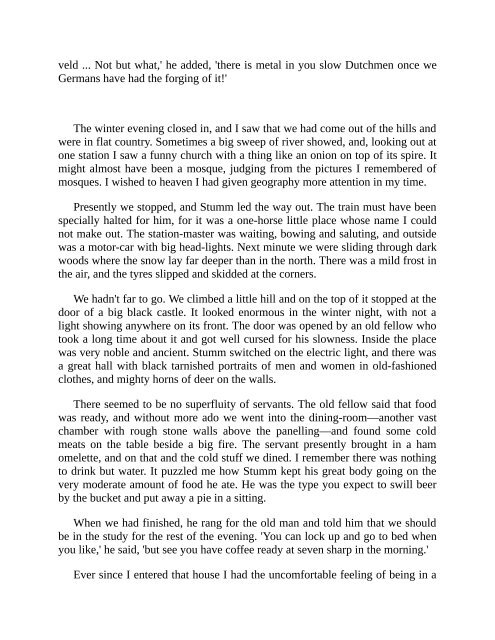Greenmantle - John Buchan
Greenmantle es la segunda de las cinco novelas de John Buchan con el personaje de Richard Hannay , publicado por primera vez en 1916 por Hodder & Stoughton , Londres . Es una de las dos novelas de Hannay ambientadas durante la Primera Guerra Mundial , la otra es el Sr. Standfast (1919); La primera y más conocida aventura de Hannay, The Thirty-Nine Steps (1915), se desarrolla en el período inmediatamente anterior a la guerra.
Greenmantle es la segunda de las cinco novelas de John Buchan con el personaje de Richard Hannay , publicado por primera vez en 1916 por Hodder & Stoughton , Londres . Es una de las dos novelas de Hannay ambientadas durante la Primera Guerra Mundial , la otra es el Sr. Standfast (1919); La primera y más conocida aventura de Hannay, The Thirty-Nine Steps (1915), se desarrolla en el período inmediatamente anterior a la guerra.
You also want an ePaper? Increase the reach of your titles
YUMPU automatically turns print PDFs into web optimized ePapers that Google loves.
veld ... Not but what,' he added, 'there is metal in you slow Dutchmen once we<br />
Germans have had the forging of it!'<br />
The winter evening closed in, and I saw that we had come out of the hills and<br />
were in flat country. Sometimes a big sweep of river showed, and, looking out at<br />
one station I saw a funny church with a thing like an onion on top of its spire. It<br />
might almost have been a mosque, judging from the pictures I remembered of<br />
mosques. I wished to heaven I had given geography more attention in my time.<br />
Presently we stopped, and Stumm led the way out. The train must have been<br />
specially halted for him, for it was a one-horse little place whose name I could<br />
not make out. The station-master was waiting, bowing and saluting, and outside<br />
was a motor-car with big head-lights. Next minute we were sliding through dark<br />
woods where the snow lay far deeper than in the north. There was a mild frost in<br />
the air, and the tyres slipped and skidded at the corners.<br />
We hadn't far to go. We climbed a little hill and on the top of it stopped at the<br />
door of a big black castle. It looked enormous in the winter night, with not a<br />
light showing anywhere on its front. The door was opened by an old fellow who<br />
took a long time about it and got well cursed for his slowness. Inside the place<br />
was very noble and ancient. Stumm switched on the electric light, and there was<br />
a great hall with black tarnished portraits of men and women in old-fashioned<br />
clothes, and mighty horns of deer on the walls.<br />
There seemed to be no superfluity of servants. The old fellow said that food<br />
was ready, and without more ado we went into the dining-room—another vast<br />
chamber with rough stone walls above the panelling—and found some cold<br />
meats on the table beside a big fire. The servant presently brought in a ham<br />
omelette, and on that and the cold stuff we dined. I remember there was nothing<br />
to drink but water. It puzzled me how Stumm kept his great body going on the<br />
very moderate amount of food he ate. He was the type you expect to swill beer<br />
by the bucket and put away a pie in a sitting.<br />
When we had finished, he rang for the old man and told him that we should<br />
be in the study for the rest of the evening. 'You can lock up and go to bed when<br />
you like,' he said, 'but see you have coffee ready at seven sharp in the morning.'<br />
Ever since I entered that house I had the uncomfortable feeling of being in a














